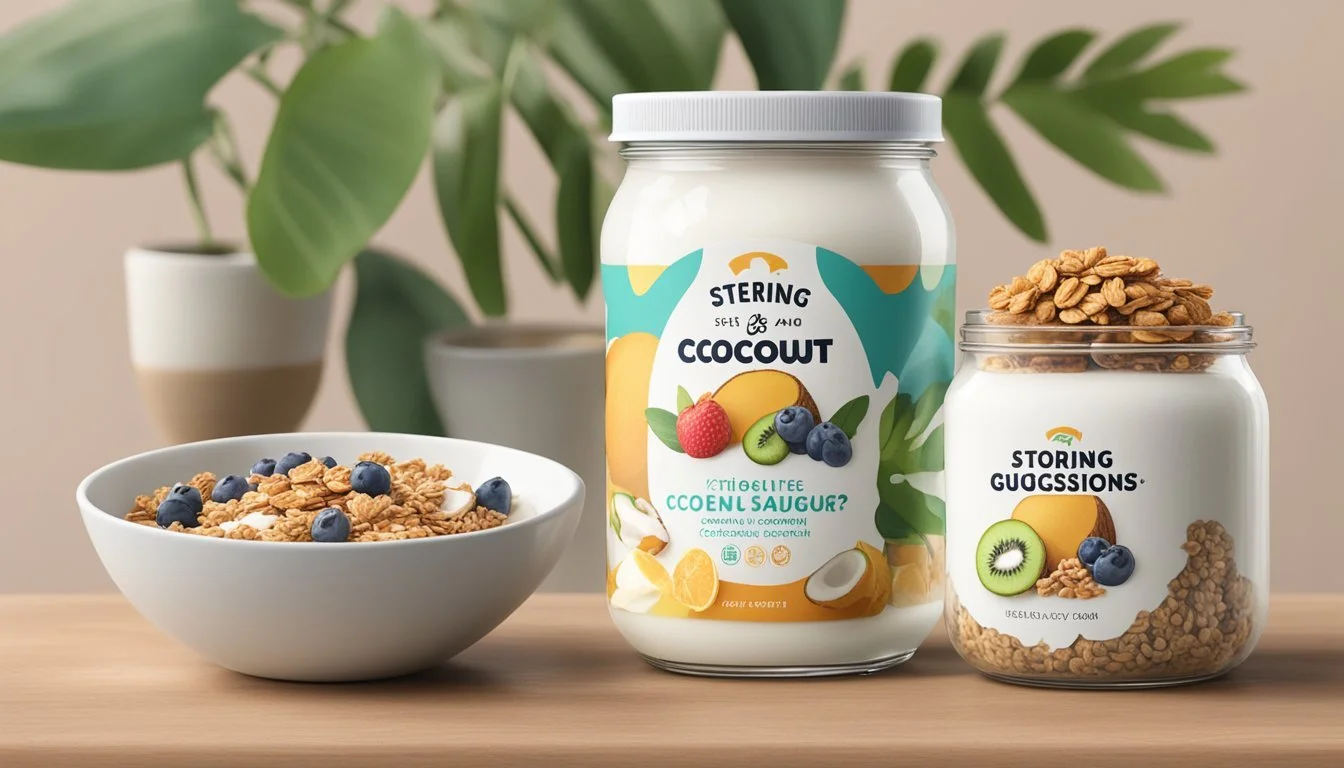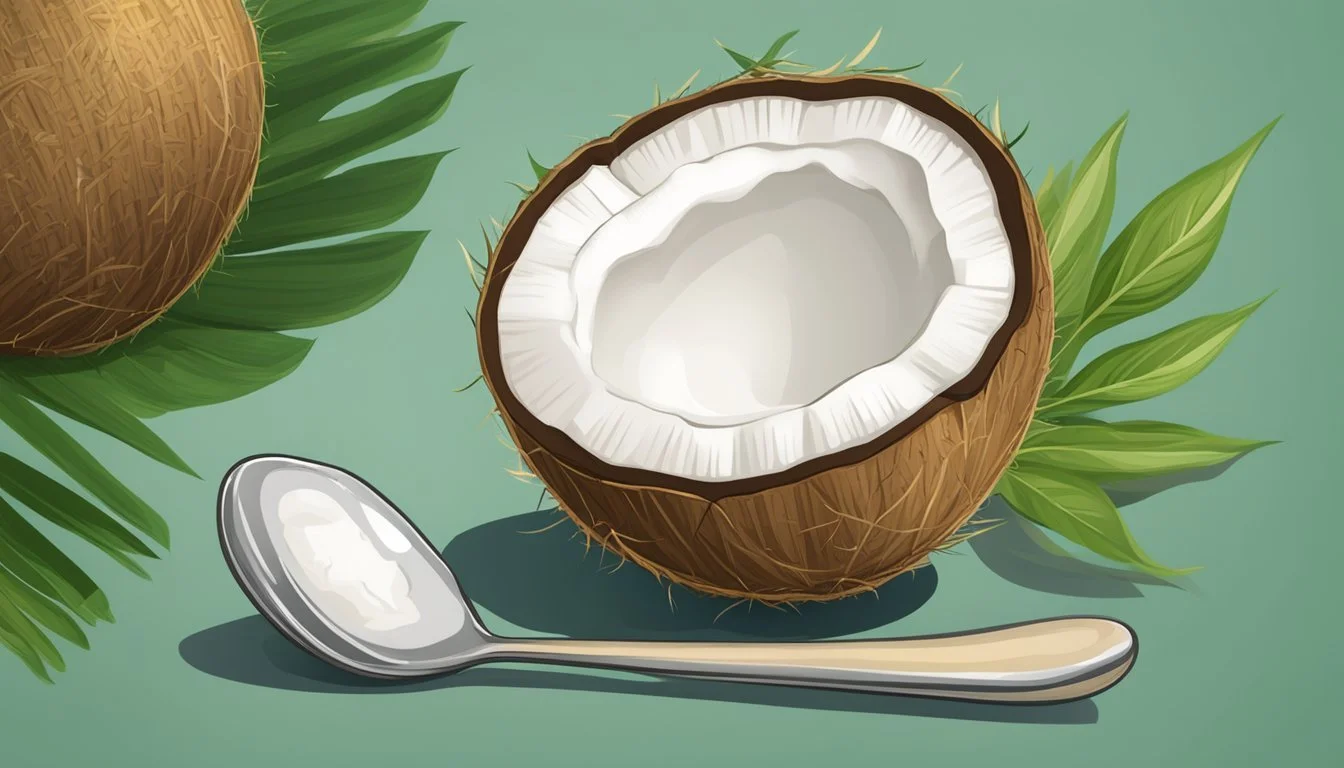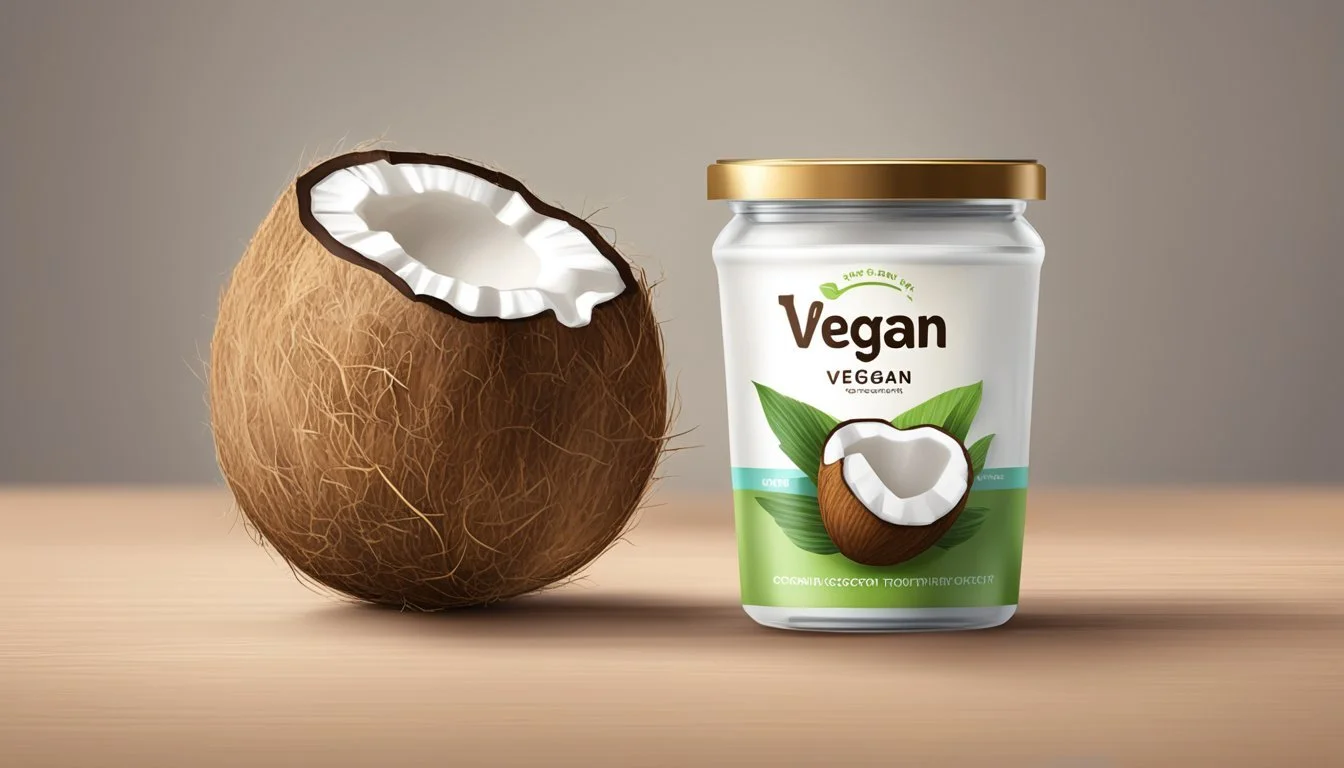Is Coconut Yogurt Vegan?
Understanding Plant-Based Dairy Alternatives
Coconut yogurt is a dairy-free alternative to traditional yogurt made from cow's milk, and it caters primarily to vegans and individuals with lactose intolerance or dairy allergies. The primary ingredient in coconut yogurt is coconut milk, which is plant-based and naturally vegan. To produce this type of yogurt, manufacturers ferment coconut milk with live bacterial cultures, similar to the process used in making dairy-based yogurt. These cultures are vegan friendly as they are not derived from animals but are instead microbial.
The increasing demand for vegan products has led to the development of a variety of coconut yogurt flavors and textures, with options ranging from thick and creamy to tangy and light. Unlike traditional yogurt, coconut yogurt does not contain lactose, casein, or any dairy by-products, making it an ideal vegan snack. However, consumers should be aware that some coconut yogurts might contain additives or thickeners, which are important to check for to ensure they adhere to strict vegan standards.
Understanding Coconut Yogurt
Coconut yogurt offers a dairy-free alternative to traditional yogurt, providing a similar texture and taste while being suitable for vegan diets. It is made from coconut milk or cream and includes beneficial probiotics.
What Is Coconut Yogurt?
Coconut yogurt is a non-dairy, vegan yogurt alternative made from the fermented milk of coconuts. It typically involves combining coconut milk or coconut cream with live cultures, which are the probiotics responsible for fermentation. Unlike dairy yogurt, coconut yogurt is inherently lactose-free, making it an ideal choice for those with lactose intolerance or those following a vegan lifestyle.
Comparison With Dairy Yogurt
Coconut yogurt differs notably from dairy yogurt in several aspects:
Base Ingredient: Coconut yogurt uses coconut milk or cream, while dairy yogurt is made from cow's milk.
Fat Content: Coconut yogurt generally has higher fat content due to coconut's natural properties but lacks dairy fats.
Protein and Calories: Dairy yogurt usually contains higher amounts of protein compared to its coconut counterpart. Calories can vary depending on the specific product and added ingredients.
Taste and Texture: Coconut yogurt often has a creamier, more tropical taste than dairy yogurt.
Health Benefits and Nutritional Value
While coconut yogurt may not meet the protein levels found in dairy yogurt, it is rich in certain nutrients and offers its own health benefits:
Probiotics: Promotes digestive health by introducing beneficial bacteria to the gut.
Healthy Fats: Contains medium-chain triglycerides (MCTs) that may support metabolism.
Nutritional Table (per 100g of coconut yogurt):
Nutrient Amount Calories Varies (typically 150-200 kcal) Protein 1-2g Carbohydrates 15-20g Fat 10-15g
Culinary Uses
Coconut yogurt excels in its versatility in the kitchen. It can be used in a variety of ways:
As a direct substitute for dairy yogurt in recipes, such as smoothies or dips.
Combined with fruits and granola for a healthy and filling breakfast or snack.
Employed in baking and desserts for a moist texture and added flavor.
Coconut yogurt's subtle sweetness and richness enhance the taste profile of many dishes, making it a favored choice among those adhering to a dairy-free or vegan diet.
Veganism and Dairy Alternatives
In the context of veganism, dairy alternatives play a pivotal role, offering plant-based substitutes that not only align with a vegan diet but also provide versatility in use and taste.
Defining Vegan Diet
A vegan diet is characterized by the exclusion of all animal products, with a focus on plant-based foods. Such a diet avoids meat, dairy, eggs, and honey, placing an emphasis on vegetables, fruits, legumes, grains, nuts, and seeds. Within this dietary pattern, the need for dairy alternatives is crucial for those looking to maintain traditional culinary experiences without the use of animal-derived ingredients.
Why Choose Vegan Yogurt?
The choice of vegan yogurt is often motivated by dietary restrictions, ethical considerations, or environmental concerns. For many, dairy-free yogurts present a way to enjoy the creamy texture and taste of yogurt without the dairy element. These yogurts can provide similar nutritional benefits to traditional yogurt, such as being a source of calcium and probiotics while being cholesterol-free and often lower in saturated fats.
Popular Dairy-Free Yogurts
Vegan yogurts typically derive from various plant bases, and some of the popular sources include:
Coconut: A rich, creamy base that closely mimics the texture of dairy yogurt. It is higher in fat content but offers a naturally sweet flavor.
Almond: This option provides a lighter texture with a nutty flavor and is generally lower in calories and fat compared to coconut yogurt.
Soy: Offering a high-protein alternative, soy-based yogurts are often fortified with vitamins and minerals to match the nutritional profile of dairy yogurt.
Oat: Known for its environmental sustainability, oat milk yogurt is allergy-friendly and presents a more neutral flavor, though it may have a distinct oat-like taste.
Dairy-free yogurt varieties have broadened, with the industry innovating to satisfy taste and texture preferences while aligning with vegan values.
Creating Your Own Coconut Yogurt
Creating homemade coconut yogurt is a straightforward process that requires minimal ingredients. It results in a creamy, dairy-free alternative rich in probiotics, with the option to personalize its flavor and sweetness.
Ingredients Required
For this recipe, one will need:
Full-fat coconut milk: Preferably canned, as it tends to have a higher fat content for a thicker yogurt.
Probiotic capsules: They act as the starter culture for fermentation.
Optional thickener: Tapioca starch, guar gum, or cornstarch can be used if a thicker consistency is desired.
Step-by--Step Process
Begin by stirring the canned coconut milk to ensure it's well combined.
Open the probiotic capsules carefully and pour the contents into the coconut milk. Avoid using metal utensils which can deactivate probiotics.
If a thicker yogurt is preferred, whisk in a thickener like tapioca starch.
Transfer the mixture to a clean glass jar and cover it with a cloth to allow it to breathe.
The yogurt must ferment in a warm environment, ideally at 108-110°F (40°C), for about 10-24 hours.
Flavoring and Sweetening
To tailor the yogurt to personal taste:
Add natural sweeteners like maple syrup only after the fermentation process is complete.
Introduce flavorings such as vanilla extract or fruit purees to the finished homemade yogurt.
Tips for the Perfect Texture
To prevent separation, ensure all ingredients are at room temperature before combining them.
Using a thickener can help achieve a creamy and thick texture more similar to traditional yogurt.
For those sensitive to additives, select canned coconut milk free from guar gum.
Maintain a consistent, warm temperature during fermentation to ensure a successful culture growth.
Storing and Serving Suggestions
Proper storage enhances the shelf life of coconut yogurt, while creative serving methods can elevate its enjoyment. These suggestions ensure that consumers can savor their coconut yogurt at its best quality and in delightful ways.
Best Practices for Storage
One should store coconut yogurt in a clean glass jar to maintain its freshness. They must ensure the storage container seals well to prevent contaminants and odors from affecting the yogurt's quality. Refrigeration is essential; coconut yogurt should be kept in the fridge at temperatures below 40°F to prevent spoilage. The cooler temperature halts bacterial growth, keeping the yogurt safe for consumption for up to a week.
Serving Ideas
Coconut yogurt can serve as a versatile component in various dishes. Breakfast options include layering it in parfaits with granola and fresh fruit, or incorporating it into overnight oats or smoothie bowls for added creaminess. For a refreshing twist, one might blend it into smoothies. When it comes to toppings, coconut yogurt pairs well with berry compote on waffles, pancakes, or French toast. For those who prefer a tangy contrast, serving it with fruit compote or as a base for savory dishes can offer a unique flavor experience.
Common Issues and Solutions
When making coconut yogurt, vegans often encounter challenges related to the texture and fermentation process. This section outlines practical solutions to these common issues.
Avoiding Separation and Mold
To avoid separation in coconut yogurt, one must ensure that the mixture is well-blended before fermentation. Should separation occur after fermentation, stirring the yogurt can recombine the layers. To prevent mold, it's crucial to use sterilized equipment and avoid introducing contaminants. Keep the yogurt covered during fermentation and store it in an airtight container in the refrigerator.
Top Tips:
Blend thoroughly before fermenting.
Use sterilized jars and utensils.
Keep the fermentation environment clean.
Achieving Desired Creaminess
For a creamy texture, the choice of coconut milk is vital; full-fat versions yield richer results. If the yogurt is too thin, adding a natural thickener, such as agar-agar or tapioca starch, can enhance creaminess. A high-speed blender can also help create a smoother consistency.
Additives for Creaminess:
Agar-agar
Tapioca starch
Troubleshooting Fermentation
Proper fermentation is the core of making vegan coconut yogurt. Use viable prebiotics or probiotic capsules with live cultures to ensure successful fermentation. The ideal temperature for fermentation should be maintained – usually around 110°F for thermophilic cultures. If the yogurt isn't fermenting, check the expiration date of the cultures and the temperature of the environment.
Fermentation Checklist:
Live probiotic cultures
Correct temperature
Unexpired prebiotics or probiotics
Advanced Coconut Yogurt Topics
In exploring the finer aspects of coconut yogurt, particularly its vegan variants, it is essential to understand key components like the role of probiotics, methods to scale up its production, and potential alternative bases.
Probiotics in Vegan Yogurt
Probiotics are the live bacteria beneficial for gut health, and they are pivotal in yogurt fermentation. Vegan probiotics are sourced from non-dairy origins to ensure the yogurt remains plant-based. Vegan-friendly probiotic capsules can be used in making coconut milk yogurt, which should contain bacterial strains such as Lactobacillus and Bifidobacterium. The process usually requires incorporating these probiotics into the coconut milk and allowing it to ferment in a controlled environment.
Scaling Up Production
To scale up coconut yogurt production from a homemade batch to larger quantities requires specific equipment to maintain consistency and quality. Tools like an Instant Pot, yogurt maker, or even a dehydrator can be used to incubate the yogurt at a steady temperature, typically around 108-110°F (42°C). This controlled environment is critical for the yogurt culture to thrive and ferment the coconut milk appropriately.
Alternatives to Coconut Milk
While coconut milk provides a natural and versatile base for vegan yogurt, alternatives like almond, cashew, and other nut milks can also be used. Brands like Aroy-D offer a variety of raw and natural nut milk options that can be fermented using vegan-friendly probiotics to cater to different taste preferences and dietary requirements. These alternatives follow a similar process to coconut yogurt, requiring careful temperature control and appropriate culturing time.
By understanding these advanced topics, producers and consumers alike can appreciate the processes and alternatives that contribute to the diversity and availability of vegan yogurt options.
Nutritional Information and Diet Considerations
Coconut yogurt is a popular dairy-free alternative that is vegan-friendly. Its nutritional profile and suitability for various diets make it an interesting option for those looking to vary their yogurt choice.
Caloric Content and Macronutrients
Coconut yogurt typically offers a higher caloric and fat content compared to traditional dairy yogurt, mainly due to the presence of full-fat coconut milk as the primary ingredient. Unsweetened coconut yogurt serves approximately 157 calories per cup (245g). It packs more energy, as it contains around three times more total fat and four times more saturated fat than full-cream dairy yogurt. Despite this, coconut yogurt usually has lower carbohydrate and sugar contents, making it suitable for those monitoring their sugar intake.
Protein: It contains significantly less protein than dairy yogurt, often providing about one-third of the amount.
Fat: The full-fat content in coconut yogurt contributes to its creamy texture and increases its satiation factor. However, individuals need to consider the higher saturated fat content in their overall dietary fat intake.
Suitability for Special Diets
Coconut yogurt is inherently dairy-free and lactose-free, thus suitable for:
Vegans: It contains no animal-derived ingredients.
Vegetarians: It is plant-based and aligns with vegetarian dietary guidelines.
Gluten-free Diets: Usually free from gluten, making it ideal for those with celiac disease or gluten sensitivity. However, consumers should always check labels for certification, as cross-contamination can occur during manufacturing.
Adding vegan protein powder to coconut yogurt can improve its protein content, making it more balanced, especially for those requiring higher protein intake. Consumers should look for coconut yogurts fortified with important nutrients such as calcium and vitamin D to closely match the nutritional benefits traditionally found in dairy yogurts.
Making Eco-Friendly and Ethical Choices
When considering coconut yogurt as a vegan option, it's crucial to reflect on the eco-friendly and ethical implications of its production.
Sourcing Sustainable Ingredients
Coconut Milk: The core ingredient in coconut yogurt is coconut milk. Consumers should look for brands that prioritize sustainable farming practices. For instance, Whole Foods 365 brand sources its coconut milk from farms that adhere to organic farming principles, supporting biodiversity and soil health.
Full-Fat Coconut Milk: The choice between full-fat and lighter alternatives also matters. Full-fat coconut milk often provides a richer taste and creamier texture but can have a higher ecological footprint due to more intensive resource use. Seeking out responsibly harvested full-fat coconut milk ensures minimal environmental disruption.
Impact of Vegan Choices on the Environment
Vegan products like coconut yogurt have a generally lower environmental impact compared to animal-derived yogurts given the absence of methane emissions from livestock. However, transportation and farming practices still contribute to their footprint. Brands that utilize renewable energy in production and opt for eco-friendly packaging further minimize the ecological impacts of their products, making vegan coconut yogurt an environmentally conscious choice.
Tools and Equipment for Homemade Yogurt
Creating vegan coconut yogurt requires specific utensils and equipment to ensure the process is successful. Here are the essentials for crafting a homemade batch.
Essential Utensils
For starters, a cook needs a glass or mason jar to ferment the coconut milk. These jars should be clean and sterilized. A wooden spoon is preferred for mixing because metal utensils can react with the probiotics. Additionally, it's important to have a saucepan to heat the mixture, and for measuring temperatures, a thermometer is crucial; an instant-read thermometer provides quick and accurate results.
Specialized Equipment
Though not always necessary, a yogurt maker can greatly simplify the yogurt-making process by maintaining an ideal, constant temperature. Another option is a dehydrator, which can also be used if it can maintain the required temperature range for fermentation.
Optimizing Fermentation Conditions
Ensuring the right fermentation conditions is key. A jar should be covered with cheese cloth to allow airflow while keeping out contaminants. For the yogurt to activate properly, it should be placed in a warm place that's consistently between 108-111°F (42-44°C). This could be anywhere from a sunny spot indoors to a slightly warmed oven (turned off).
Conclusion
Coconut yogurt offers a plant-based alternative to traditional dairy yogurt, aligning with vegan dietary preferences. It is crafted from coconut milk and can be prepared at home or purchased as a ready-made product. Typically, it achieves its distinct tanginess and probiotic benefits through the incorporation of vegan starter cultures or probiotics.
Nutritional Profile: Coconut yogurt tends to be rich in healthy fats and is often fortified with additional vitamins and minerals, making it a nutritious option for a dessert or snack.
Culinary Flexibility: Its creamy texture and slightly tangy flavor make it a versatile component in various culinary applications, from breakfast bowls to smoothies.
Accessibility: With the rise of plant-based diets, coconut yogurt has become increasingly accessible in supermarkets and health food stores.
Environment and Ethics: For consumers with environmental and ethical considerations, coconut yogurt typically has a lower ecological footprint than dairy-based yogurt, although the impact may vary based on sourcing and production methods.
In summary, coconut yogurt is an excellent vegan choice for those seeking a dairy-free yogurt alternative that doesn't compromise on taste or texture. Whether included in a vegan diet for ethical, environmental, or health reasons, it can be a satisfying addition to one's culinary repertoire.









